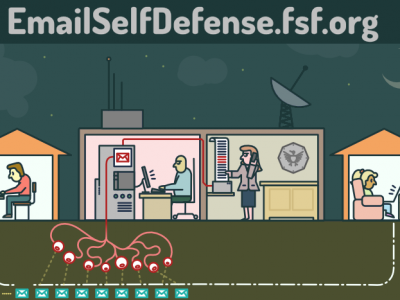Stories from Quick Reads and German
German Company's Videos Imagine Modern Women as Passive and Dependent
Women in Germany are outraged over one insurance company's videos explaining different types of policies, in which women are described as passive and naive — a role more in line with the expectations of the 1950s than 2015. Birte Vogel writes on her blog Thea – Frauen in Sprache, Medien und Gesellschaft (Thea –...
Russian Government IP Address Caught Editing German Wikipedia MH17 Article
IP addresses inside the Russian government continue to be active on Wikipedia, where a computer at the Russian Secret Service, the FSO, revised the German entry for Malaysia Airlines Flight 17, changing the word “separatists” into “rebels.” The Twitter bot @RuGovEdits, which automatically logs all Wikipedia edits made from Russian government IP...
Learn How to Protect Your Email Communication in Less Than 30 Minutes
Email Self-Defense, a beginner's guide to email encryption by the Free Software Foundation (FSF), was released in six new languages [fr, de, jp, ru, pt, tr] on June 30, 2014. More languages are underway. Even if you have nothing to hide, using encryption helps protect the privacy of people you communicate with, and makes life difficult for bulk...
Inspired by FC Barcelona's Dani Alves, Germans Say No to Racism With #BananaSelfies
Someone in the stands at a football match in Spain threw a banana at Dani Alves. The Brazilian footballer responded by picking up the fruit and eating it.
List of Deceased in Venezuela Protests Available in 5 Languages
In the blog Panfleto Negro [es], John Manuel Silva and Emiliana Duarte are keeping a list of confirmed deaths from the ongoing protests taking place in Venezuela. The list -originally in Spanish- has been translated into English, German, Italian and French.
“Another Face of Africa”: Call for Photos, Stories
A group of young volunteers from southern Germany, many of whom have lived in Africa, are calling for photos, essays, videos, blog posts or poems by locals of five major African cities: Lagos, Addis Ababa, Gaborone, Kigali and Kinshasa. With a forthcoming exhibition called “Sichtwechsel,” their goal is to show...
As Darkness Falls – Berlin Conference
Berlin is welcoming the digital intelligentsia to a conference this weekend (January 25-26) on “self-empowerment in the age of digital control”. Speakers at the event, As Darkness Falls, include Jacob Appelbaum, Bruce Sterling, Micah Sifry, Evgeny Morozov and from Global Voices, Asteris Masouras (@asteris). See program in English and German....
‘Abita’, Animated Short Film About Fukushima Children
“Abita”, an animated short film about Fukushima children who can't play outside because of the radiation risk, delicately illustrates their dreams and realities. The film, produced by Shoko Hara and Paul Brenner, won the award for Best Animated Film at the International Uranium Film Festival in 2013. Shoko Hara, a...
“Catalan Independence” Explained in 16 Languages
The debut video of The Catalan Project (@Catalan_Project) features Fernando de Castro, “a Catalan from Galicia and Spanish”, presenting the project and explaining why some Catalans want independence from Spain using the 16 languages he is able to speak. Subtitles are available in English, French, German, Spanish and Catalan. The Catalan Project, an...
Germany: Security Above the Constitution
Comments from leading MPs in Germany on the surveillance scandals and security issues prove to be a cause for concern.
Asylum Seekers in Germany: Integration or Slavery?
Asylum seekers will carry luggage at a train station in Gmünder, Germany for €1.05 an hour if a proposed integration project is passed.
Fukushima: No Place Like Home
‘No Time for Anger [de]’, a visualization journal by a team of Swiss media reporter and designers, illustrates Fukushima two years after the triple catastrophe of the Tōhoku earthquake and tsunami followed by the Fukushima Daiichi nuclear disaster on March 11, 2011. Fearing radiation, some residents sought evacuation to other areas...
Composer's Ode to Turkish Protesters
German musician Davide Martello performed live during the protests in Istanbul's Taksim Square. This track is dedicated to the Soldiers of Light, the victims of this insane violence by the turkish government. Composed during the protests in Istanbul two weeks ago… live in the crowds on Taksim Square. That's how...
Catalonia: Caution about Spain's Hostile Ways
A civic statement on Col·lectiu Emma (@CollectiuEmma)'s blog criticizes the way the Spanish government is dealing with the political situation in the region of Catalonia, where 55 % of the population favors independence [ca] from Spain, according to an official poll. The statement explains the “strategy of fear” and other...
Germany's Outcry Over Sexism Grips Twitter #Aufschrei
Journelle tweeted about a hashtag that has gripped the German twittersphere: What I like about #aufschrei [outcry] is that it’s bringing much-deserved attention to these disgusting incidents of casual sexism that might otherwise be played down. Using the hashtag #aufschrei [de], female Twitter users have been reporting the sexual harassment...
Presenting the Balkan Minorities
Fifteen young journalists from six different countries have produced a series of personal stories about representatives of the minorities (in a broad sense) from Bosnia and Herzegovina, Kosovo, Serbia, and Macedonia. The stories are available in English, German, and French on the Face the Balkans website.
Germany: Satire Magazine Calls for Complimentary Ph.D.s
After a series of scandals surrounding the academic achievements of German politicians who cheated on their dissertations, the online satire magazine“Der Postillon” is now calling for a complimentary Ph.D. [de] for all politicans: This way, the embarrassing and politically dishonorable rescinding of doctorates can be avoided. The Ministry of Education...
Germany: Improve Reporting on Disabled People
It ought to become something understood in the language that disabled people do things not in spite of or because of, but with their disabilities. During the Paralympics in London there have been more and more reports on “against-it-all people” or “supercripples” in the media. leidmedien.de explains how to get...
Germany: “Rundshow” A New Social TV Format
The Bavarian broadcasting company, Bayerischer Rundfunk, in Germany recently launched a social TV experiment called “Rundshow” [de] (Roundshow). Viewers are actively incorporated into the show through virtual means such as Google Hangout, videos, an app called “Die Macht” (The Power), and Twitter. The concept of blurring the lines between TV...
Macedonia: Animated Hitler Meme as a Free Resource
As a reaction to the corporate efforts to enact an even more draconian legislation and in response to the attempts of the distributor of the film Downfall to take down the Hitler meme on copyright grounds, Ribaro published [mk] an animated parody of the iconic scene, free for download and...
Estonia: The SS-Trap Revisited
Kloty of Gedanken über Estland portrays [ger] Estonia's ambivalence over its historic past, as rumours and denials recur that the government wants to declare Estonians who fought in German uniform during the Second World War freedom fighters.





